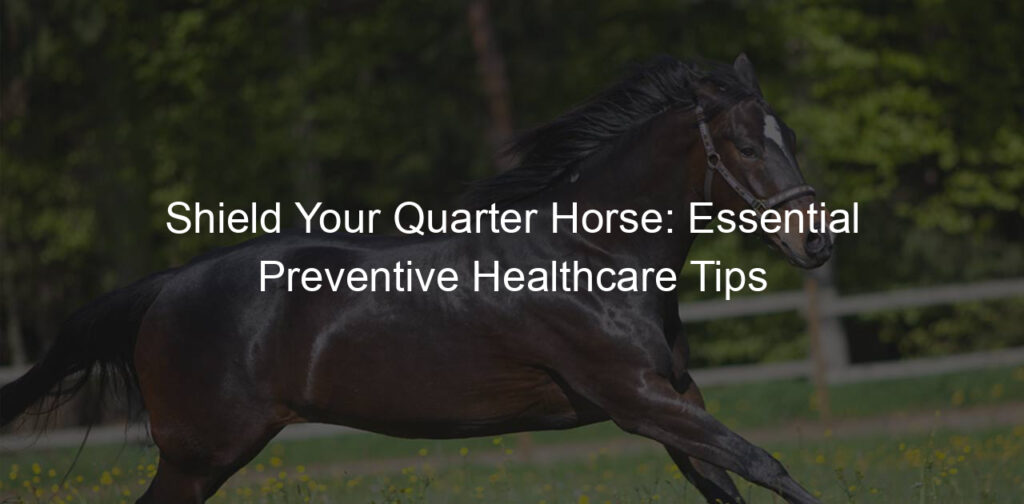Introduction to Quarter Horse Health Care
Hey there, horse lovers! Today, we’re going to chat about something super important: Quarter Horse health care. Just like us humans, our four-legged friends need regular check-ups and care to stay fit and healthy. So, let’s dive right in!
- Importance of preventive care for horses
- Understanding the unique needs of Quarter Horses
Ever heard the saying, “An ounce of prevention is worth a pound of cure?” Well, it’s totally true, especially when it comes to our horses. Regular vet visits, vaccinations, and deworming can help keep your horse healthy and happy. Plus, it can save you from some big vet bills down the road. According to Wikipedia, preventive care can help detect health issues before they become serious problems. So, remember, a little prevention goes a long way!
Now, let’s talk about Quarter Horses. These guys are special, and not just because they’re super fast and super cute. They have unique health needs that we need to be aware of. For example, they’re more prone to certain conditions like navicular disease and polysaccharide storage myopathy. So, if you’re a proud Quarter Horse owner, make sure you understand these needs and work with your vet to keep your horse healthy.
Alright, that’s it for our introduction. Stay tuned for more tips and tricks on Quarter Horse health care. And remember, a healthy horse is a happy horse!
Preventive Care for Quarter Horses: An Overview
Hey there, horse lovers! Today, we’re going to chat about how to keep our Quarter Horses healthy and happy. Prevention is always better than cure, right? So, let’s dive into it!
Quarter Horse Diseases Prevention
Just like us, our four-legged friends can also get sick. But don’t worry, we can do a lot to prevent this from happening. Let’s first understand what kind of diseases Quarter Horses commonly face.
- Common diseases in Quarter Horses
- Effective preventive measures
Some common diseases that Quarter Horses can face include Equine Influenza, Strangles, and Laminitis. Equine Influenza is like a cold for horses, while Strangles is a bacterial infection that affects the respiratory system. Laminitis, on the other hand, is a painful condition that affects the horse’s feet. Here is a link to learn more about these diseases.
Now, let’s talk about how we can prevent these diseases. Regular health check-ups are a must. Your vet can catch any issues early and treat them before they become serious. Vaccinations are also important to protect your horse from certain diseases. And don’t forget about dental care! Just like us, horses can have tooth problems too. So, make sure your horse’s teeth are checked regularly.
Remember, a healthy horse is a happy horse. So, let’s do our best to keep our Quarter Horses healthy and disease-free!
Equine Preventive Healthcare
Hey there, horse lovers! Let’s talk about something super important – keeping our Quarter Horses healthy and happy. And guess what? It’s easier than you might think! All it takes is a little bit of regular care. Let’s dive in!
- Regular Health Check-ups
Just like us humans, our four-legged friends need regular health check-ups too. It’s a great way to catch any potential health issues early. A vet can check things like their heart, lungs, and overall body condition. It’s recommended to have a check-up at least once a year. But if your horse is older or has health issues, you might need to do it more often.
- Importance of Vaccinations
Vaccinations are a big deal! They protect our horses from nasty diseases like Equine Influenza or West Nile Virus. Your vet can help you figure out which vaccinations your horse needs and when they should get them. Remember, prevention is always better (and cheaper!) than cure. So, don’t skip those shots!
- Dental Care
Did you know horses’ teeth keep growing throughout their life? That’s why dental care is so important. Regular check-ups can prevent problems like sharp edges or uneven wear. And trust me, a horse with a toothache is not a happy horse! So, make sure to get those chompers checked at least once a year.
So there you have it, folks! Three simple steps to keep your Quarter Horse in tip-top shape. Remember, a healthy horse is a happy horse. And who doesn’t want that?
Horse Health Maintenance: A Comprehensive Guide
When it comes to horse health, there’s a lot to consider. But don’t worry, we’re here to help! This guide will cover everything you need to know about keeping your Quarter Horse healthy and happy.
Quarter Horse Wellness
Quarter Horses are known for their strength and agility, but they also require specific care to maintain their health. Here are two key areas to focus on:
-
Nutrition and diet
Just like us, horses need a balanced diet to stay healthy. This includes a mix of grains, hay, fruits, vegetables, and plenty of fresh water. According to the American Association of Equine Practitioners, a horse’s diet should be about 1-2% of their body weight in hay or forage. Always remember, every horse is unique, and their dietary needs can vary based on their age, size, and activity level.
-
Exercise and training
Exercise is crucial for a Quarter Horse’s health. Regular workouts help maintain their muscle tone, improve their cardiovascular health, and keep their minds sharp. Training should be varied and fun, including activities like trail riding, jumping, or even just a leisurely walk. Remember, overworking your horse can lead to injuries, so always monitor their condition during exercise.
By focusing on nutrition and exercise, you can ensure your Quarter Horse stays in top shape. Remember, a healthy horse is a happy horse!
Preventive Veterinary Care for Quarter Horses
When it comes to keeping our Quarter Horses healthy and happy, preventive veterinary care plays a crucial role. Let’s take a closer look at what this involves.
- Role of a Veterinarian in Preventive Care
- Regular Vet Check-ups
- Emergency Care
A veterinarian is like a doctor for horses. They help prevent diseases by giving vaccinations, deworming, and providing advice on proper nutrition and exercise. They also perform routine check-ups to catch any health issues early on. Veterinarians are trained to spot the subtle signs of illness that we might miss. Their expertise can make a big difference in the health and longevity of our Quarter Horses.
Just like we need regular doctor visits, our horses need regular vet check-ups too. These check-ups usually include a physical examination, dental check, and sometimes blood tests. They help ensure that our horses are in top shape and catch any potential health problems early. It’s recommended to have a vet check-up at least once a year.
Despite our best efforts, emergencies can happen. In such cases, a vet’s role becomes even more critical. They can provide immediate treatment for injuries, sudden illnesses, or any severe health issues. It’s essential to have an emergency plan in place, including the contact number of a trusted vet who can respond quickly in a crisis.
Preventive veterinary care is an investment in our Quarter Horses’ health. By working closely with a vet, we can ensure our horses live long, healthy, and happy lives.
Horse Health Prevention: Practical Tips
Hey there, horse lovers! Today, we’re going to talk about some practical tips to keep your Quarter Horse healthy and happy. Let’s dive right in!
Equine Health Management
Managing your horse’s health is a big responsibility, but don’t worry, we’re here to help. Here are a couple of key areas to focus on:
- Managing stress in horses
- Proper grooming and hygiene
Just like us humans, horses can get stressed too. Stress can lead to health problems like colic and ulcers. So, how can you help your horse chill out? Well, regular exercise and a consistent routine can do wonders. Also, make sure your horse has plenty of social time with other horses. Remember, a happy horse is a healthy horse!
Keeping your horse clean is not just about looking good, it’s about staying healthy. Regular grooming helps prevent skin diseases and allows you to check for any cuts or injuries. Plus, it’s a great way to bond with your horse! So, grab that curry comb and let’s get grooming!
Remember, prevention is better than cure. By managing stress and maintaining good hygiene, you’re already taking big steps towards keeping your Quarter Horse healthy. Stay tuned for more tips and tricks!
Quarter Horse Health Check-ups
Let’s talk about health check-ups for your Quarter Horse. These are super important to make sure your horse is happy and healthy. So, what can you expect during these check-ups and how often should they happen? Let’s find out!
- What to expect during a health check-up
- How often should your horse be checked
When it’s time for a health check-up, your vet will give your horse a thorough examination. They’ll check things like your horse’s weight, teeth, and hooves. They’ll also listen to your horse’s heart and lungs to make sure everything sounds good. Your vet might even take some blood samples to check for any hidden health issues. It’s kind of like when you go to the doctor for a check-up!
So, how often should these check-ups happen? Well, most vets recommend that your horse gets a health check-up at least once a year. But if your horse is older or has some health problems, they might need to be checked more often. It’s always a good idea to chat with your vet and figure out the best schedule for your horse.
Remember, regular health check-ups are a great way to catch any health problems early. So, make sure to schedule those check-ups and keep your Quarter Horse feeling their best!
Conclusion: Ensuring Your Quarter Horse’s Health
As we wrap up our discussion on Quarter Horse health, let’s take a moment to reflect on the key points we’ve covered. The health of your Quarter Horse is a journey, not a destination. It’s about making the right choices every day, from preventive care to long-term health maintenance.
- Importance of preventive care
- Long-term benefits of health maintenance
Preventive care is like the foundation of a house. It’s what keeps your Quarter Horse strong and healthy. Regular vet check-ups, vaccinations, deworming, and a balanced diet are all part of this. Remember, it’s always easier to prevent a problem than to treat one. As the old saying goes, “An ounce of prevention is worth a pound of cure.” Learn more about preventive care here.
Health maintenance is the ongoing care that keeps your Quarter Horse in tip-top shape. This includes regular exercise, dental care, hoof care, and mental stimulation. The benefits? A happier, healthier horse with a longer lifespan. Plus, it can save you money in the long run by avoiding costly health issues. Find out more about horse health maintenance here.
In conclusion, your Quarter Horse’s health is in your hands. With preventive care and health maintenance, you can ensure your horse lives a long, happy, and healthy life. So, let’s saddle up and take this journey together!









